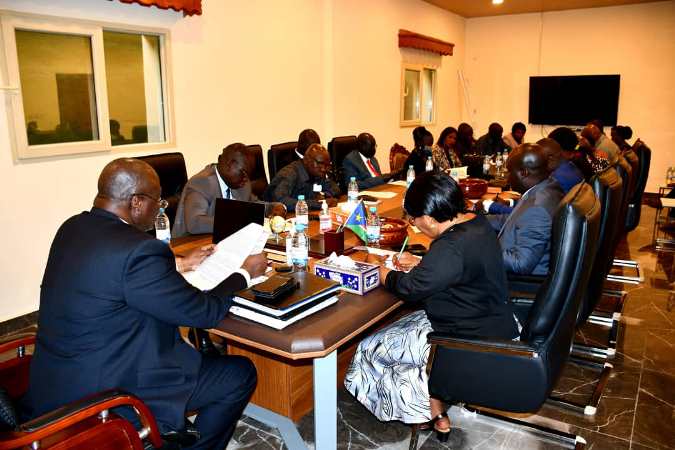Machar convenes emergency meeting, denies he was ousted
August 5, 2021 (JUBA)- South Sudan’s First Vice President Riek Machar convened on Thursday an emergency meeting and dismissed claims that he had been ousted and replaced by the armed opposition (SPLM-IO) chief of staff, General Simon Gatwech Dual.
The development follows what appears to be a power struggle within the leadership of the country’s main opposition movement after Dual opted to stay out of Juba, preferring implementation of all provisions of the 2018 revitalized agreement, such as the security arrangement.
Dual, a long time ally of Machar, attributed his dissatisfaction to the inability of the SPLM-IO leader to visit troops in the countryside and urged the Intergovernmental Authority on Development (IGAD) to release the SPLM-IO leader to go and brief the armed opposition fighters on the implementation of the revitalized peace agreement.
The decision by the SPLA-IO chief of staff to stay out of Juba was interpreted by the government and some of those in Machar’s inner to mean Dual was opposed to the implementation of the peace deal.
In a meeting held on Tuesday in Magenis in Upper Nile State, high ranking military figures in the armed opposition movement, including Gen. Gatwech, Gen. Johnson Olony Thubo, and Gen. Thomas Mabor Dhoal all agreed to oust Machar and replaced him with Dual.
The group claimed Machar no longer represented the interests of the movement.
On Thursday, however, Machar dismissed the declaration, saying “The declaration is intended to derail the formation of the unified command, graduation, and the deployment of the unified forces, which remain an outstanding priority after the conclusion of the reconstitution of the national legislature,”
Dual’s decision to suspend the group’s chief of military intelligence General Dhiling Keah following allegations of misconduct over accusations of planning to defect to President Salva Kiir’s side polarized the leadership and dampened relations between the two leaders in the movement.
Machar overturned suspension escalating the power struggle within the group.
In June, President Kiir appointed Dual as a presidential advisor on peace upon nomination by Machar, but he (Dual) declined the offer, challenging the legal basis of the position to which he was appointed in the peace deal.
He also questioned the legitimacy of the group, pointing to recent decisions in which he removed and replaced Dual, putting him outside military structure after appointment into an advisory position.
“The three generals who met in Magenis do not constitute the SPLA-IO leadership of the Military Council. The Military Council is composed of the Commander-in-Chief, Chief of General Staff and his deputies, commanders of the nine sectors, and commander of the General Headquarters,” the statement reads in part.
“At the time of the declaration, Gen. Simon Gatwech Dual had already been relieved from command and appointed as Presidential Advisor for Peace. However, the Military Council does not make the political decisions of the movement but the Political Bureau or the National Liberation Councils in the absence of the National Convention,” it added.
The leadership also assured the members of the movement and the people of South Sudan in general that the “situation is under control”.
The meeting also discussed the constant harassment, arbitrary arrests, and detention of the movement personnel by security organs linked to the factions under President Salva Kiir, particularly In Juba and other towns in the country.
It “discussed and condemned, as a matter of principle, the arbitrary detention of some members of the People’s Coalition for Civil Action, as this group was exercising its constitutional right of freedom of speech, expression, and association even though the SPLM/A (IO) does not necessarily agree with the content of their message.”
“In light of this, the Political Bureau demands the immediate release of these detainees,” the communique stressed, adding that the meeting “discussed the blatant violation of the power-sharing agreements in the Administrative Areas.”
Meanwhile, the armed opposition movement reiterated its commitment to the full implementation of the peace agreement in letter and spirit, urging other parties to the accord to do the same.
In September 2018, the warring factions in South Sudan’s civil war signed a revitalized peace agreement to end the country’s civil war. The peace accord stipulates that there shall be a transitional government formed after eight months of the pre-transitional period.
(ST)

